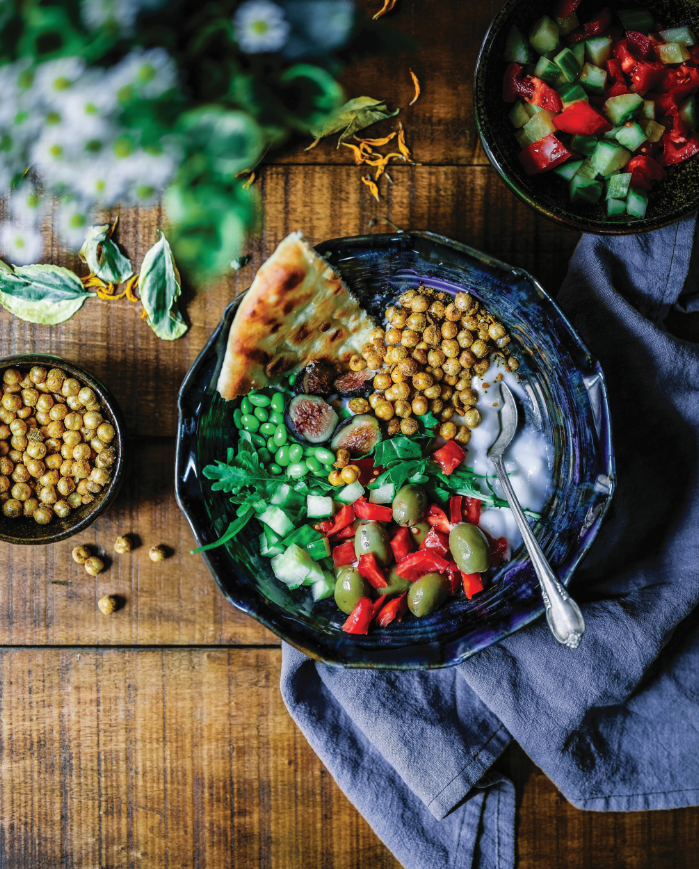Making Food Choices In Harmony | By Penny Wilson
I know — harmonizing with your food sounds “woo woo.” You’re probably asking, “Why would I want to do that? When I think of harmony, I think of music and singing; I don’t think of food.” However, when I looked up the definitions of harmony, there was one that made sense for how harmony and food fit together: agreement or concord.
When thinking about the things that influence your food choices — flavor, texture, appearance, marketing, customs, culture, cost, etc. — harmony isn’t in the list. Rather than trying to make it fit, how about we add three more influences: harmonizing food with your body, values and the world.
HARMONIZING FOOD + YOUR BODY
Much like a choir that has sopranos, altos, tenors and basses to create a harmonized song, your food choices provide nutrients that harmonize with your body, so you feel good and stay healthy.
Your body needs protein, carbs, fat and water. The amounts of each of these can vary for each person. One person can eat mostly carbs and feel great, while someone else feels best on a high fat diet. Your body also needs vitamins, minerals and phytochemicals from foods to stay healthy and have a strong immune system.
In addition to just the nutrients in food, you can also choose foods that your body gets along with. For example, those with celiac disease or gluten intolerance feel better eating gluten-free foods. If you know of a food that doesn’t work well for your body — maybe it gives you heartburn, gas or you get achy after eating it — you can create an agreement (harmony) with your body to not eat foods that make it feel less than its best.
Providing the nutrients your body needs and food that it gets along with creates concord (harmony) with your body, because you’re giving your body what it needs to be healthy and are doing all the things you ask it to do while not causing it (and yourself) discomfort.
HARMONIZING FOOD + VALUES
How can your values harmonize with your food choices? Here are three examples:
• If you value supporting local businesses, you can support your local CSA group and farmer’s market. This helps you keep your money with local producers and, in the case of a CSA, support a local farm.
• If you value adventure, you could be adventurous by trying new foods. You could also make trying new foods an integral part of your travels by taking cooking classes or trying restaurants that serve food specific to the region you’re visiting.
• If you value creativity, you can get creative with how you cook and serve food. Finding new recipes — or even learning how to cook — can be a creative endeavor. You could also learn different ways to plate the food when you serve it.
Harmonizing food with your values can help you have a deeper commitment to your values so that your food-related actions are in alignment with those things you value.
HARMONIZING WITH THE WORLD AS A WHOLE
Producing food in the U.S. is resource-intensive — most of those are related to non-renewable energy resources. One study by Emory University found “the American food supply is driven almost entirely by non-renewable energy sources and accounts for approximately 19% of the total use of fossil fuels in the United States.”
If you want to reduce the amount of energy used in food production, one of the easiest steps is to only buy what you will use. It seems simple but takes practice to get good at it. Watch how much food, and what foods, you throw away. Then, next time adjust and cook a smaller amount, which should result in throwing away less, if anything at all.
Donating extra food from your refrigerator or pantry to the local food bank keeps it from being part of the 108 billion pounds of food thrown out each year. When produce isn’t edible, you could either compost it or see if there is a farm that can feed it to their livestock. You can also compost leftovers that don’t get eaten instead of putting them in the trash or down the garbage disposal.
START SMALL FOR SUCCESS
Maybe you’re feeling overwhelmed with these ideas. They may seem like BIG things. You don’t need to do all of them at once.
Start small and choose one thing to work on — maybe just becoming aware of how much food you’re throwing out — then work to change that one thing. Or, honor your adventurous side and try a new fruit or vegetable. Small steps can add up to big changes, and before you know it your food choices will harmonize with your body, your values and the world.
 Penny Wilson, PhD, is a Registered Dietitian Nutritionist and a Certified Intuitive Eating Counselor. She focuses on helping people never diet again. Through Intuitive Eating her clients move from fear of food to freedom with food and eating. Dr. Penny works with clients in person and virtually all over the country. She loves spending time with her husband, John, and her dogs. She knits, reads, hikes, skis (both alpine and Nordic) and travels. You can find out more at her website: DrPennyWilson.com and facebook.com/DrPennyWilson.
Penny Wilson, PhD, is a Registered Dietitian Nutritionist and a Certified Intuitive Eating Counselor. She focuses on helping people never diet again. Through Intuitive Eating her clients move from fear of food to freedom with food and eating. Dr. Penny works with clients in person and virtually all over the country. She loves spending time with her husband, John, and her dogs. She knits, reads, hikes, skis (both alpine and Nordic) and travels. You can find out more at her website: DrPennyWilson.com and facebook.com/DrPennyWilson.Originally published in the Winter + Spring 2021-22 issue.
Optimize your immune system with nourishing herbs such as Elderberry, Burdock, Nettles, Cleavers and Astragalus. Serve yourself up [...]

Subscribe to Our Tribe
Stay up to date with Y+L News, Events and special announcements.










